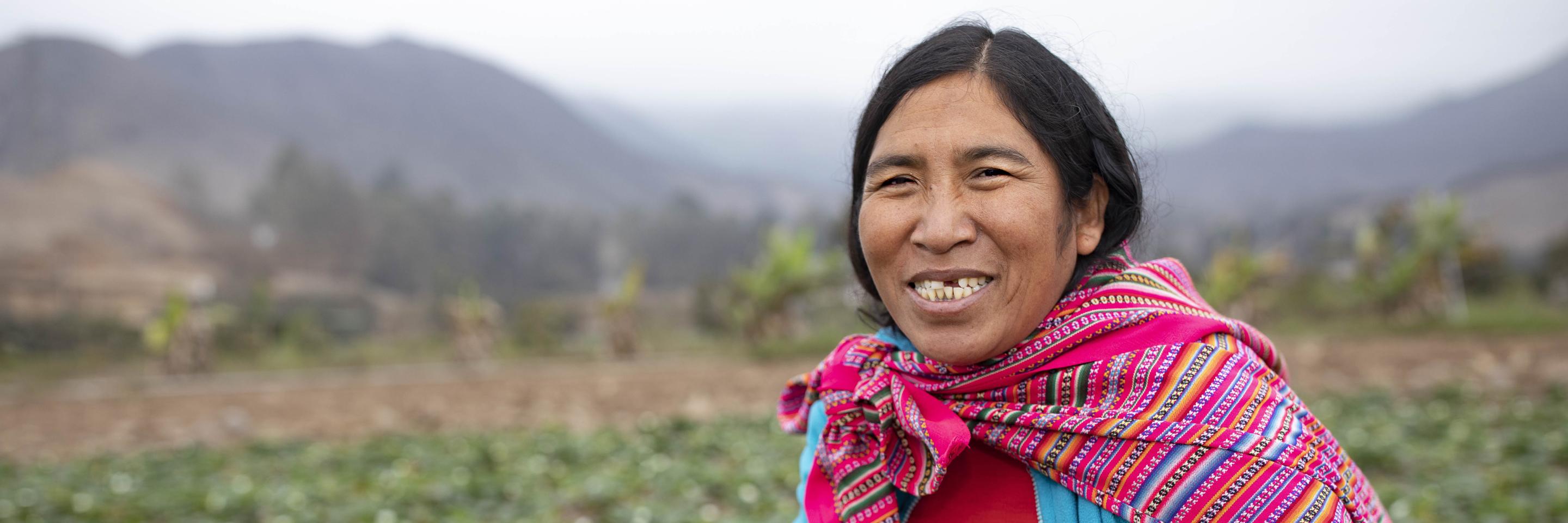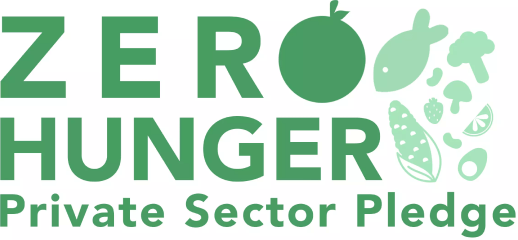
Stories from Companies
PepsiCo Inc.
The PepsiCo Zero Hunger Private Sector Pledge includes investment in sustainable agriculture and food security initiatives. The President of the PepsiCo Foundation & Global Head of Philanthropy at PepsiCo, C.D. Glin, shares his thoughts on why his company is committed to ending hunger and how they are doing so through the Private Sector Pledge.
What is your company’s interest in food security?
As one of the world’s largest food and beverage companies, PepsiCo is also an agricultural company. We source approximately 30 agricultural crops and ingredients from more than 7 million acres across approximately 60 countries, so agriculture is crucial to our business and to the growers and communities where we operate. With this scale, we recognize that we have the opportunity to play a critical role in leveraging our global capabilities to achieve local impact and help realize zero hunger in our communities.
PepsiCo aims to help build the kind of food system that can feed a growing global population – expected to be nearly 10 billion people by 2050 – while seeking to regenerate the earth, mitigate climate change, and meet the needs of our communities. This also makes good business sense – creating a more resilient, sustainable food system helps to protect our continued business growth from disruption due to climate change, water scarcity, and other environmental and social risks.
Why did your company join the Zero Hunger Private Sector Pledge?
Through the Zero Hunger Private Sector Pledge, PepsiCo is pledging to invest $100 million in positive agriculture and food security initiatives by 2030. In joining the pledge, we aim to accelerate ongoing efforts to help establish a more sustainable food system – from sourcing ingredients to supporting communities and improving livelihoods throughout our supply chain. We do this because, simply put, without embracing a more sustainable food system, from scaling regenerative agriculture, sourcing ingredients sustainably and working to improve the livelihoods of our agricultural supply chain and communities, our ability to source the necessary ingredients for our products is at risk, as is the world’s ability to reliably access safe and healthy foods.
Tell us more about the programmes you are implementing through the Pledge
Our ambitious pledge will be met in partnership with over 20 organizations across more than 20 priority markets. Through these partnerships, we aim to leverage PepsiCo’s capabilities and resources to make nutritious food accessible daily to communities where we live and work; and expertise to improve the livelihoods of people in our agricultural supply chain and communities by 2030.
For example:
Our partnership with CARE's She Feeds the World program aims to impact 5 million small-scale women producers and their families with education, resources and economic support to help them increase crop yields and improve family nutrition.
Quaker Qrece is a clinically proven intervention model that works with children 2-5 years of age in Mexico and Guatemala to overcome malnutrition. The program delivers PepsiCo-produced specialized food to address malnutrition and carries out workshops on hygiene, nutrition, and health, in partnership with local partners Un Kilo de Ayuda and CARE.
Quaker Bowl of Growth, an evolution of Quaker Qrece, launched in India in early 2023 in partnership with the MAMTA Health Institute for Mother and Child. The program aims to provide 1,000 children aged 3-5 years in Maharashtra with a specialized, oat-based cereal product and educational resources, free of charge. The locally acceptable recipe of ‘Panjiri’, from a millet and multigrain-based Quaker product, contains 18 additional micro-nutrients and was designed by the PepsiCo R&D team specifically to the local needs of children from the region.
In Brazil, the Solidarity Kitchens program is helping improve economic opportunity and food security in partnership with Gastromotiva – supporting local community kitchens with logistic support, kitchen supplies and a monthly income to kitchen workers.
We have contributed more than $10 million to the World Food Program through various programs during a decade-long partnership, and plan to continue these investments as part of our pledge. Together, we’ve created a multi-country partnership in the Middle East and North Africa, focusing on improving long-term food security needs of communities affected by climate change, conflict, natural disasters and humanitarian crises. In addition, WFP has benefited from a program that engages PepsiCo associates in physical activity to earn grants. To date, support has been provided to school meal programs in the Philippines, Pakistan, Colombia, Haiti, Ethiopia and Kyrgyzstan.
What has been the impact of this programme? How do you measure the impact?
PepsiCo measures the impact of these programs together with our partners and in some cases a third-party validator – what we measure and how may vary depending on the specific program and its objectives, and in many cases detailed impact assessments will not be available until the end of the program when longer-term impact can be seen and captured. That said:
By the end of 2022, we scaled regenerative agriculture across more than 900,000 acres globally We have also worked with farmers across the globe to plant cover crops on over 700,000 acres of land, resulting in an approximately 450,000 metric ton net reduction in on-farm greenhouse gas emissions, including soil carbon sequestration.
Quaker Qrece has been executed for 10 years by PepsiCo Mexico and makes 4,000 monthly deliveries to local communities. In Guatemala, the program works with more than 2,500 children and their families who receive one package a day for 12 months.
Our partnership with CARE’s She Feeds the World program is operating in seven Pledge priority markets. Here are examples of impact from two of those markets:
Egypt: the program has empowered 58,422 local farmers and members of their communities in Behira, Giza, Minya and Beni Suef, with education, resources and economic support to help them increase crop yields and improve family nutrition.
Uganda: As of December 2022, the program reached 541,630 people, increased resilience and bolstered food and nutrition security of women by 46%, and 55% of households reported increased household incomes, and 80% of the participants were food secured, and 87.7% felt the program responded to their overall well-being and food security according to the endline survey.
Since 2021, the Solidarity Kitchens program has provided 336,735 meals to Brazil community’s most vulnerable families.
Who has been able to benefit from these programmes? What has been the feedback?
Our Pledge’s “On the Farm” investments benefit farm and farm workers in our supply chain and in the communities in which we live and work. Specifically, we focus our work on the most vulnerable farming communities linked to our global value chain, including smallholder farmers and farm workers, women and minority farmers.
Our partnership with CARE’s She Feeds the World Program provides just one example of the tangible benefits provided to beneficiaries of the programs we are counting towards our pledge. We know that women, for example, account for almost half of all agricultural labor in developing countries yet often lack basic farming needs: proper agricultural tools, training, and land rights. By increasing women’s access to resources and markets and improving nutrition in their communities, PepsiCo and CARE are working to better position vulnerable communities to face uncertainty and be more resilient in the face of growing global food insecurity and hunger. For example:
For Hilda Salcedo, 33, an organic strawberry farmer in Pachacamac, Peru, participating in technical trainings helped her improve irrigation practices that increased her yields and business profits. Salcedo’s experience in the program also is impacting the livelihood and nutritional access of others in her community. As her yield grew, she was able to hire six additional staff members, and has established herself as a young leader among other farmers the region. She now has an active voice on water irrigation practices as a member of the Irrigation Board Committee in Peru.
Molly Birungi, a 43-year-old farmer, tailor, and mother of three from western Uganda is an amazing example of how powerful women are and their ability to transform their communities. Molly went through She Feeds the World in Uganda and is part of a coalition of female farmers that grows and sells potatoes, beans, maize and other vegetables. Molly was so successful and passionate about the work, she became a trainer herself and helps other female farmers. But Molly didn't stop there. With encouragement from her fellow participants, Molly ran for the office of District Councilor and won.
What are the challenges you face in implementing the programme? What are your objectives over the short and medium term, i.e., will you be able to scale this programme?
The complexity of our global supply chains means that making an impact in upstream farming communities requires close partnership and collaboration with other stakeholders. We also expect to continue encountering systemic barriers related to cultural norms, sociopolitical disruption, infrastructure deficiencies and, in some cases, lack of well-established legal systems.
Despite this, we remain resolute in our ambitions for global food security and are proud to say that we are already executing programs to address hunger and food security at scale. In terms of longer term objectives, in 2021 PepsiCo announced its PepsiCo Positive (pep+) strategy – our roadmap for how we operate within planetary boundaries and promote positive change for the planet and people. pep+ seeks to fundamentally transform business as usual for our industry by inspiring and working alongside our peers to advance positive social, environmental and economic change for all, including goals related to, by 2030:
Spreading the adoption of regenerative agriculture practices across 7 million acres, approximately equal to our entire agricultural footprint used around the world to grow our crops and ingredients for our products;
Improving the livelihoods of more than 250,000 people in our agricultural supply chain and communities, including by economically empowering women; and
Partnering with communities to advance food security and make nutritious food accessible to 50 million people.
What is the role of the private sector in achieving the SDGs?
At PepsiCo, we believe there is a vital role for the private sector to play in collaboration with public sector and non-profit partners by bringing our performance, our scale, and our people to help solve global challenges at the local level.
Achieving the SDGs requires society to address a complex set of socio-cultural, political, geographic, and economic factors. These variables are not going to be addressed by any one actor or industry alone, but rather through a truly whole-of-society approach facilitated by partnership across sectors. By working in collaboration with industry peers, local and international organizations, and our employees globally, PepsiCo and others in the private sector can leverage our unique expertise and capabilities to help accelerate progress towards these goals.
